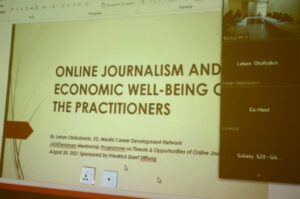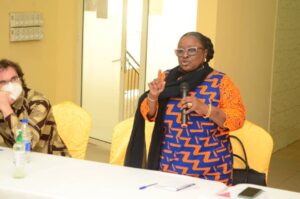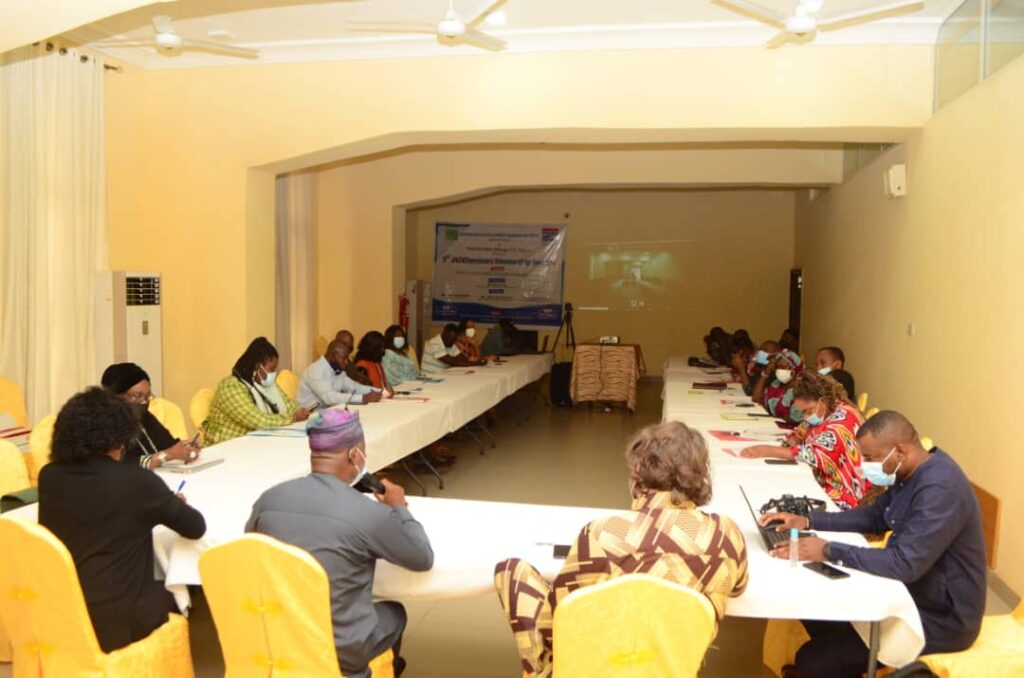On August 20, 2021, the third mentorship programme of the Journalism and Development Seminars (JADESeminars) Initiative, was held at the Catholic Secretariat of Nigeria, (CSN) Resource Centre, in Abuja. It was the second in the series to be sponsored by Friedrich Ebert Stiftung, (FES), Nigeria.
The target of the training were journalists of five (5) years and below in the profession resident in Abuja, with some joining online from other parts of the country.
The theme of the session – Threats & Opportunities of Online Journalism – was chosen to, in addition to surveying the threats and opportunities, also look at, if any, how journalism ethics is impacted by online practices. This is in recognition of the challenges of constant threats by the government to promulgate media regulatory laws to according to it, curtail excesses of online media.
If allowed to come to fruition, the government-envisaged law has the capability of adversely impacting the nation’s fledgling democratic process, hindering free speech and freedom of expression, while limiting access of Nigerians to technological innovations in communication such as the internet and social media.
JADESeminars, working with organisations that share in its commitment to journalism as an instrument of development, use this edition of its mentorship session to examine how journalists in legacy and online media, and as well as bloggers, have the capability of contributing to the resolution of the conflicts in the country. This is especially so, as the country approaches the next cycle of election under the existing climate of insecurity.
At the heart of the topic – Threats and Opportunities of Online Media is the issue of technological innovations for communication, the benefits it offers journalists, the pitfalls and how to navigate such pitfalls. Nigeria’s journalists of the communication revolution age, undoubtedly have a big role to play in using their platforms to help build back Nigeria on the path of development.
In the age of ICT, which has revolutionised the media, influencing how journalists gather and disseminate news, for the particularly ICT-savvy young journalists who deploy a multimedia approach to news gathering and reporting, understanding the threats inherent and opportunities there for the taking, all of course within the ambit of the ethics of the profession becomes most useful as they seek to report events in real-time.
Resource persons for the session were foremost journalists from the print and electronic media. They included Mr. Dapo Olorunyomi, Publisher, Premium Times, Mrs Moji Makanjuola, former NAWOJ President and Founder International Society of Media in Public Health, and Mr. Lekan Otufodunrin, accomplished journalist, journalism trainer and mentor, who is also the executive director of Media Career Development Network.
The opening session had in attendance Mr. Buki Ponle, managing director of the News Agency of Nigeria, who was the Chairperson, Resident Representative of the Friedrich Ebert Stiftung (Foundation), Nigeria, Dr. Daniel Mann, Mr. Emmanuel Ogbeche, Chairman, FCT NUJ Chapel and Editor, Abuja Inquirer and Hajia Raheemat Momodu, President, International Visitor Programme and Secretary, JADESeminars BoT, among others.
********************************************************************************
Mr. Ponle in his opening address described the coming of online media as one of the defining moments in journalism, a trend which he noted, altered media practice everywhere.
The NAN MD expressed worry about the publishing of unverified stories by some online media, a trend he said, even the traditional media is guilty of. According to him, The EndSARS movement exemplified this ‘deplorable’ development. Notwithstanding, the NAN MD remarked that “placed side-by-side with traditional media, online media has many advantages and has become the preferred path for many aspiring reporters”
Drawing from his many decades in the Journalism profession, Mr Ponle advice journalists, especially those to become online journalists to always ensure that their facts are not just accurate, but that they must ensure to cross-check such facts.
In addition, he advised them to remain independent and no matter how difficult it may seem, they should discard personal prejudices, strive towards balance, while remaining alert and conscious of the impact of words could have.
Resident Represent of FES, Dr. Daniel Mann remarked on the importance of framing in news reports and the need to reflect on who is saying what? Which information is based on fact? And whether the source is reliable?
Addressing the participants, NUJ FCT Chapel, Mr. Ogbeche, congratulated participants for being part of the training, adding that there are many training opportunities for journalists to access free of charge, thus dispelling the anxiety of funding for training. He encouraged them to not be “comfortable in your spaces – move out, explore”
The mentorship session witnessed three presentations beginning with Mr. Otufodunrin, who spoke on Online Journalism and Economic Well-Being of The Practitioners. Mr. Otufodunrin touched on various aspects that had a relationship to the topic, such as the State of the media, the impact of the internet on the print media, economic well-being and what it means, through to his own personal experience in online journalism, a definition of the term – online journalism and who qualifies to be called an online journalist.

He began by advancing two hypotheses on journalism and being a journalist. They are
- Journalism is not for people who want to be rich
- Journalism is not about making money but making an impact for society to be better
On State of the media today in Nigeria, he acknowledged the dire economic stress under which media houses operate and the financial impact of this on the journalists. The dire economic situation which has been complicated by digital disruption, he said, has caused some media house to fold up, while offering others the opportunity to become more innovative
Delving into his personal experience in online journalism, he recounted the first time he had a desktop computer solely to himself while on a media Fellowship in the UK, the freelance opportunities that came thereafter and his launch of an online Christian News to his appointment as Online editor of one of the influential newspapers in Nigeria – The Nation, an appointment he disclosed received mixed reviews from fellow journalists who saw it as either a demotion or being consigned to the backyard of journalism. To him, however, the appointment was a blessing that opened up the media space for and to him.
He defined online journalism as a “contemporary form of journalism that encompasses data. Fact-checking, evidence-based reporting and solution journalism among others” and an online journalist as “a professional journalist (guided by the principles and ethics of the profession) who can provide a variety of media – text, audio, video, and photographs (maps, infographics”
Speaking on the topic of Online Journalism: Between Civic Crusading, political mobilisation, and journalism Mrs Moji Makanjuola, MFR, noted that the origin of online/digital journalism to contemporary times has become its advantages, in the sense that online journalism is cost-effective, creates role convergence where the line between reporter and editor becomes blurred, and it is also fast and convenient.

The media she said owes society a duty of gatekeeping, a duty to set agenda for societal progress, and a duty to the vulnerable as part of ‘crusaders’ for the common good. She added that in times of difficult challenges such as calamities befalling a nation, times of war, epi/pandemics, political strife or environment, online journalism has the potential of playing a big role to highlight these and many more.
She then warned that ‘negative mobilization for self enthronement in the political space without delivering the rightful dividends of democracy is what online journalism must guard against, and then went ahead to outline what she considered as ‘constant truth for online journalists’ rather than, sole political mobilisers.’
These include being impartial in the crafting of stories, avoiding political manoeuvres especially for money and engaging in evidence-based and balanced reporting
For online journalism to make the necessary positive impact, this media genre must do well to curb excesses, engender judicious application of resources, encourage accelerated development, and eschew the fostering of extremism.
Speaking on Online Journalism and Professional Accountability Mr Olorunyomi, described online/digital journalism as the distribution of editorial content via the internet, a practice he said, has greatly enabled the democratisation and spread of information, previously controlled by traditional analogue media.

Drawing a difference between content and platform in a news organisation, the frontline journalist described the content as the news and information while the platform is the avenue through which news and information are disseminated such as broadcast, print and online. He also described journalism as the lifeblood of “deliberative democracy”, noting that it is through that process that ‘news and analysis by which society communicates with itself, allowing it a measure of self-government is provided.
Journalism he said owes its primary obligation to the truth and primary loyalty to the citizens. This is irrespective of the platform being used by the journalist. In that regard, there are some defined elements of journalism through which the hunger for awareness is met. They include, “accuracy and facts, verifiable claims, independence of agency, and an overwhelming public interest.”
All the above make for accountability in journalism, and such accountability is given constitutional backing by different countries across Africa such as Nigeria in section 22 of its Constitution; Ghana in Section 162 (5), the Gambia in Section 207(3); Liberia in Section 15[c], and Sierra Leone in Section 11 of their individual constitutions.
Accountability in journalism he said, is about independently scrutinising people in power, the conduct of state officials at all levels. The tools for this include traditional investigative reporting, fact-checking political speech, digging into digital data and aggressive beat coverage to reveal as much as possible about what is really going on.
However, while the media holds public officials accountable, the media (and journalists) have a responsibility to equally hold themselves accountable and show commitment to the interest of the public, he added.
In journalism, professional accountability matters because the profession is continuously ‘mutating’ due the social media and user-generated content, otherwise called citizen journalism and so to serve the public well in the face of these competing content and platform, the professional journalists must strive to be accurate, independent, verifiable, and accountable among other attributes.
The presenter took this forward by highlighting the versions of journalists’ code of ethics as proclaimed by different media groups such as “the Ilorin Declaration” of 1998 by the Nigerian Press Organisation, the Nigerian Guild of Editors’ Code of Conduct (1972), and the Society for Professional Journalists re-packaged NPO Code of 1998,
Audience participation
Each of the three presentations was followed up by comments, questions, and moments of interaction between the presenter and the participants. Questions were also received from a few of the online participants.
Group Mentoring Session
Following on the heels of the presentations and interactive sessions, the participants were grouped into two for maximum interaction with the resource persons/mentors, with Mr Otufodunrin, joining the session via zoom.
The group session afforded the mentors the opportunity and speak directly and in a spontaneous way, engendering a lively interactive session. The mentors took questions from the mentees and responded to areas of specific need in their careers. This lasted for about 1 ½ hour.

Areas mentored on include how to turn around press statements to great copies; how to handle snubs by media relations people; how to manage and plan the home front and/or fit it into the work process/schedule; exercising patience and working your way up the ladder, need to, and how to take opportunities that present themselves for self-enhancement and how to create a suitable environment that encourages fairness and equity when reporting online; ways to ensure that your stories are good to broadcast or publish among others.
Earlier in her welcome remarks, Coordinator of JADESeminars Ms Angela Agoawike, explained why the group embarked on mentorship as one of the core focus of its activities. According to her, it was to create an opportunity for constructive professional interaction between older successful professionals with young journalists in order to impart success tips and encourage the younger professionals. This, she said, is borne out of the group’s belief in the ability of the journalist to help bring change to any society in which she/he operates.
She encouraged the journalists to always ensure to update their skills, listen to experts, and imbibe new ideas that facilitate quality journalism and thus, quality service to society.
JADESeminars Mentors programme is a giving-back project that seeks to mentor and empower younger professionals.

